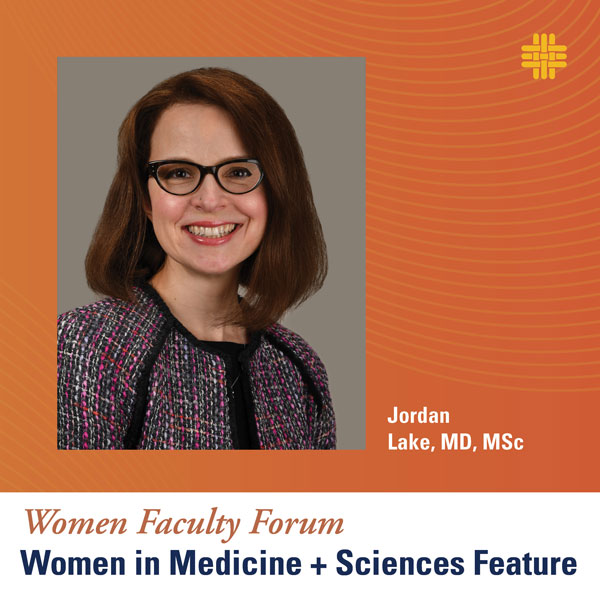Women in Medicine & Sciences Feature: Jordan Lake, MD, MSc

Each month, the Women Faculty Forum presents its Women in Medicine and Sciences Feature, highlighting the women faculty at McGovern Medical School who are leaders in medicine, research, and education.
This month’s feature is Jordan Lake, MD, MSc, associate professor in the Department of Internal Medicine.
What is your background? When did you join UTHealth Houston?
Born in Nacogdoches, Texas. Raised all around Texas, but I went to high school in Deer Park. I went to college at The University of Texas in Austin and medical school/residency at Baylor College of Medicine. I completed a infectious diseases fellowship and master of science in clinical research at UCLA and came to UTHealth Houston in September 2016.
What inspired you to pursue a career in science and medicine?
Science was the obvious choice, even as a child, and the HIV epidemic was always forefront in my mind. Medicine was not planned, but I decided to apply to medical school after participating in an MD/PhD summer program experience at the University of Cincinnati. Once I decided to go to medical school, the plan was to care for and be involved in research to improve outcomes for people living with HIV (PLWH).
My interests in gender care came later, when I was caring for transgender patients with HIV and realized there was no real evidence-based medicine to guide care. Some guidelines exist now, but the field of transgender medicine and metabolic disease of PLWH are still just emerging all these years later.
What are you current clinical and/or research interests?
Metabolic comorbidities in PLWH, with a focus on adipose tissue disturbances (fatty liver disease, obesity, dysfunctional fat, etc.), and optimization of care for transgender women, with a focus on minimizing metabolic disease.
What do you enjoy most about working at UTHealth Houston?
It is a collegial environment that has been supportive of my work. I moved from UCLA to help Dr. Roberto Arduino grow the HIV clinical research program and establish a research program for transgender women with HIV, and we have done both successfully. UTHealth Houston supported me in that.
How do you think UTHealth Houston can further support female faculty?
By asking people what they need and want on a periodic basis, because it will change over time. Even if the circumstances don’t allow those things to come to fruition, knowing the institution is interested in supporting you goes a long way.